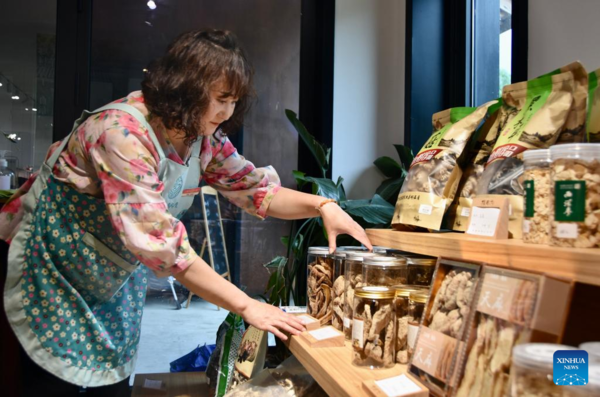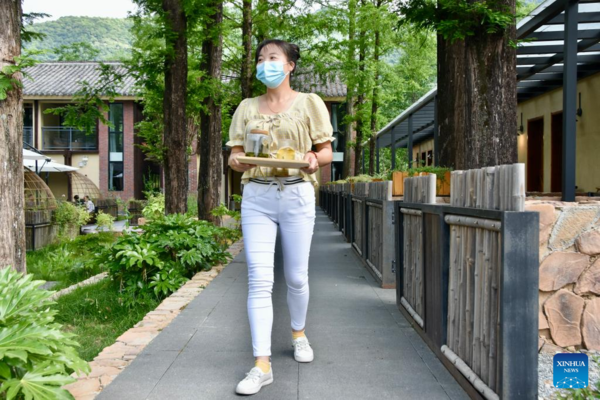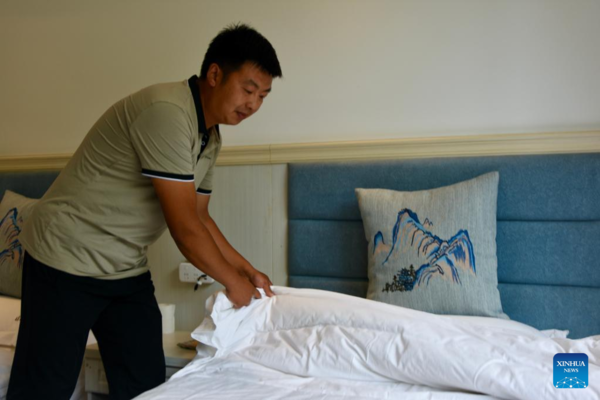Across China: Farmers in China's Qinling Mountains Embrace a New Career
 |
| Housekeeper Liu Jianhong sorts out local agricultural products on the table at a bed and breakfast (B&B) in Liuba County of northwest China's Shaanxi Province, June 21, 2022. [Xinhua/Zheng Xin] |
XI'AN, July 11 (Xinhua) — In addition to the routine chores such as cooking, cleaning and bed-making, Liu Jianhong has learned some new skills, including making coffee, using a computer, and making scented candles since she started to work for a bed and breakfast (B&B) in her village in 2020.
Liu is a farmer from Liuba County in the city of Hanzhong, northwest China's Shaanxi Province. Her hometown, which boasts a beautiful environment and cool climate, has become a favored destination for tourists in summer.
Along with the increasingly popular B&B, more and more villagers in Liuba County have embraced new jobs in their hometown as B&B housekeepers.
"I worked in Xi'an for many years but had never drunk a cup of coffee. Now I make more than a dozen cups per day," Liu said as she drew a peach pattern on top of her newly made coffee.
The 42-year-old had been working alone as a decorator in Xi'an, the provincial capital, for nearly a decade. As her child entered high school, she applied for a housekeeper job at a B&B that opened in her village.
In the beginning, the training became a headache for her. "I didn't only have to operate unfamiliar equipment such as coffee machines and computers but also had to learn reception etiquette from scratch. I had to learn to speak Mandarin with euphemistic tones."
After a month and a half of theoretical study and practical training, 12 of the 20 women trained with Liu got the completion certificate and started going to work nearby.
"We are all from villages nearby," Liu said. Now she commutes to work on time like a city dweller and earns nearly 4,000 yuan (about 598 U.S. dollars) a month. Though the money is less than she used to make in Xi'an, her cost of living is much lower, and she can take care of her child.
Liang Weiqi, deputy director of the culture and tourism bureau in Liuba County, said B&B housekeepers differ from service personnel in other accommodation industries. They not only clean rooms and cook for customers but also often participate in various activities.
For example, they introduce customers to the cultural customs of the Qinling Mountains and take them into the mountains to look for animals and plants. They are travel consultants and even temporary family members, Liang said.
Zhang Yong, a villager from Tiekuang Village of Liuba County who used to run a small shop, has converted his five adobe houses into a two-story B&B and works as both boss and housekeeper.
Since its opening more than two years ago, this 12-room B&B is almost fully booked every weekend and has attracted many regular customers. Among them, a Shanghai couple lived for half a year here last year, and this spring, they came back like migratory birds to continue their stay.
"I came up with the design and decoration of this B&B by watching videos. Every year, new facilities and activities will be added. The more projects I ran, the more I felt I didn't have enough skills," Zhang said, adding that people like him need to constantly accept new knowledge and skills to become competent housekeepers.
The Ministry of Human Resources and Social Security is considering adding 18 new professions to reflect the country's occupational development and boost graduate employment and entrepreneurship. B&B housekeeper is among the new professions.
This industry, which sprouted in the countryside, is becoming an option for more and more Chinese rural laborers and migrant workers to start businesses and find jobs nearby.
Liuba County, with less than 40,000 permanent residents, has promoted 74 people to start B&B businesses. Now, there are 18 B&Bs, offering nearly 200 rooms, and more than a dozen B&Bs will likely open in the next one or two years. So the housekeepers are in dire need here.
In 2021, Liuba County launched a project to train 100 housekeepers in three years. Thanks to a well-known housekeeper training system of a B&B operation brand in China, 60 trainees have passed the examination and obtained the professional qualification of housekeeper, and all of them have found jobs.
"Qualified housekeepers have more advantages in employment. Many of them have already been booked by B&B operators during their training," said Jiang Xuefeng, director of the county's employment and entrepreneurship service center.
Since the establishment of the first B&B in 2016, many local rural workers have acquired new skills and ushered in a new life, driving local consumption of agricultural products and rural revitalization, according to Jiang.
 |
| Housekeeper Xie Juan works at a bed and breakfast (B&B) in Liuba County of northwest China's Shaanxi Province, June 21, 2022. [Xinhua/Zheng Xin] |
 |
| Zhang Yong, owner of a bed and breakfast (B&B), cleans a room in Liuba County of northwest China's Shaanxi Province, June 21, 2022. [Xinhua/Zheng Xin] |
(Source: Xinhua)
Please understand that womenofchina.cn,a non-profit, information-communication website, cannot reach every writer before using articles and images. For copyright issues, please contact us by emailing: website@womenofchina.cn. The articles published and opinions expressed on this website represent the opinions of writers and are not necessarily shared by womenofchina.cn.






.jpg)

 WeChat
WeChat Weibo
Weibo 京公网安备 11010102004314号
京公网安备 11010102004314号